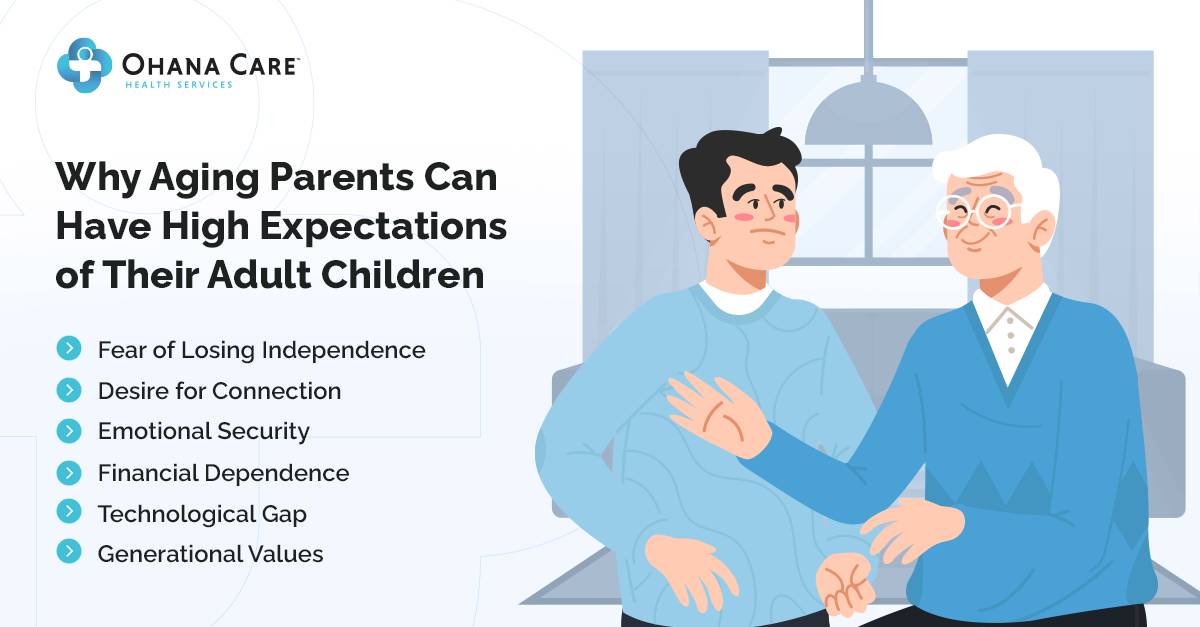Taking care of aging parents is a great way to give back for all the support, guidance, love, and care they provided you throughout your life.
However, when aging parents expect too much, it can feel like your heart is being torn in two directions: one urging you to stand by and support them unconditionally and the other reminding you of the unrealistic expectations placed on you.
In this article, we explain why aging parents may have high expectations of their children and provide five tips on what to do when aging parents expect too much.
Why an Aging Parent May Expect A Lot From Their Adult Children

Old age can bring significant mental and physical changes to one’s life.
For seniors, their friends may pass away or move closer to their own families, leading to isolation and loneliness. Also, poor health concerns can become more prominent, requiring more frequent doctor appointments, treatments, and personal care. Additionally, cognitive decline, ranging from mild forgetfulness to more severe conditions like dementia, can further complicate daily living and decision-making processes.
When you consider all of the life changes happening in your parents’ daily lives, you may notice that they depend on you as the one constant in their lives.
Tips for Family Members on Navigating High Expectations From Aging Loved Ones

Unfortunately, when parents age and rely on you more for tasks like household maintenance, grocery shopping, financial assistance, or emotional support, you can stretch your capacities to their limits.
If you constantly support your parents, you may get burnout, which can heavily impact your well-being and mental health.
Below, we’ve listed five tips on what to do when aging parents expect too much so you can foster a healthier child-parent relationship built on understanding, respect, and clear communication.
1. Acknowledge Your Caregiving Limitations
When working on building a less reliant relationship with your parents, it’s important to understand your caregiving limitations so you can set realistic boundaries and expectations.
Before having a conversation with your parents about them expecting too much, ensure you clearly understand how much time, energy, and resources you can realistically provide them.
Here are some questions you may want to ask yourself:
- To what extent can I financially support my aging parent without jeopardizing my own financial security and future plans?
- How many hours per week can I really dedicate to providing companion care without compromising my work and personal life?
- What specific tasks can I handle, considering my physical abilities, knowledge, and emotional strength?
2. Ask Questions & Listen to Their Concerns
Once you’ve come to terms with the amount of physical, emotional, and financial support you can actually provide, you should take the time to understand what your older parents need from you.
It’s easy to jump the gun and complain or feel like you need to call it quits because you’re overwhelmed with their dependence on you, but it’s important to remember that you only know and feel your side of the story.
Remember, it can be scary and stressful to age.
Maybe your parents rely on your social interaction because their mobility issues limit them from fully engaging in community activities. Or maybe they are starting to have hearing loss, making it nerve-racking to get out of their home, so they feel isolated.
Here are some conversation starters that may help you better understand their side of the story and the real root of why they are depending on you so much:
- “I value our relationship and want to make sure I’m supporting you in the best way possible. What are the most important things you need from me right now?”
- “I want to ensure we’re on the same page regarding our expectations. What do you envision our roles and responsibilities are in this phase of our lives?”
- “I’m committed to supporting you, but I also want to make sure I can balance my personal needs. Can we discuss realistic boundaries and expectations that work for both of us?”
- “I’m curious about what’s driving your expectations. Can you share your concerns or any specific reasons behind them?”
3. Set Boundaries & Realistic Expectations
Once you’ve outlined what you are willing to give to help your aging parents and have a better understanding of what they require of you, you should instill clear boundaries.
By establishing boundaries and realistic expectations, you can ensure:
- You are not over-exerting yourself
- Your parents receive the love and attention they deserve
- A healthy balance between caregiving and your own well-being
- Amore sustainable and positive caregiving environment
- Positive communication within the family
The challenging part of setting these boundaries and expectations is ensuring they are followed. Here are a few ways to maintain your boundaries.
Be Consistent
As with any new routine, consistency is key.
Once you’ve established a caregiving routine that works for both you and your aging parents, stick to it. Maintaining this consistency will minimize confusion by setting clear expectations and roles for both parties.
Additionally, consistency will build anticipation and joy for your visits, transforming them into moments both of you look forward to.
Have an Open & Honest Communication Policy
Once you have your boundaries and expectations in place, you may have to pivot your plan. For example, maybe your kids are starting soccer, and you are no longer available on Saturday afternoons, or maybe your parents join a seniors group and can’t have dinner every Tuesday anymore.
It’s normal for life changes to happen, but it’s imperative that if they happen, you have an open conversation about how the changes affect your family’s caregiving schedule.
4. Encourage Community Activities
Encouraging your parents to participate in community activities can enrich their lives, give them a sense of belonging, and reduce their dependency on you for social interaction.
If your parent is physically and mentally able, here are some community activities and groups you may want to encourage them to join:
5. Get Additional Support From Professional Caregivers
One of the most impactful actions you can make when your parents expect too much is to gain additional respite support from other caregivers.
Respite care services, like those offered by Ohana Care, provide temporary relief for caregivers, allowing you to recharge while ensuring your loved ones are in good hands.
Respite care can be a great support, as respite caregivers can support your aging parents with a handful of tasks, including:
- Transportation to medical care appointments
- Going on walks/ doing safe and effective exercises
- Grocery shopping
- Companionship when doing fun and stimulating activities
- Transportation or accompaniment to senior care activities
- House cleaning
Let Ohana Care Help Your Elderly Parents

As an adult child, your parents can heavily rely on you, leaving you overwhelmed and stressed out.
At Ohana Care, we understand the challenges that come with caring for aging parents, especially when they have high expectations.
If you’re struggling with unrealistic expectations put on you by your parents but feel guilty or are struggling to find solutions to navigate these high expectations, consider getting respite support.
By trusting Ohana Care with your respite care needs, you can take the necessary time for yourself while knowing your loved ones are receiving compassionate, professional care. Additionally, respite care can be a great option if your aging parents live far from you.
Do not feel guilt or shame for setting boundaries and doing what’s best for you.
Because “In the end, it’s not about the quantity of time we spend with our parents, but the quality of moments we create.” – Unknown
Contact us to learn more about how we can help ease the caregiving journey for you and your family.



